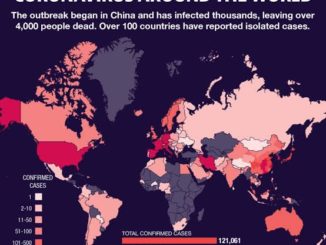
The International Monetary Fund on Tuesday said the recession caused by the COVID-19 pandemic would be the worst economic downturn witnessed since the Great Depression.
According to the IMF, Nigeria’s economy will contract by 3.4 per cent in 2020, but rebound with 2.4 per cent growth in 2021.
The Great Depression, a severe worldwide economic downturn that took place mostly during the 1930s, beginning in the United States, was the longest, deepest, and most widespread depression of the 20th century.
The Great Depression is commonly used as an example of how intensely the global economy can decline.
The IMF made the projection in its latest edition of the World Economic Outlook, which was released at the ongoing Spring Meeting in Washington, US.
Nigeria’s economy grew by 2.2 per cent in 2019.
The imminent recession was tagged the ‘Great Lockdown’, obviously with reference to the shutdown of economic activities in several countries in a bid to curb the spread of the pandemic.
According to the IMF, the pandemic will shrink the global GDP by three per cent in 2020.
Following the pattern set by the World Bank, which predicted an imminent recession in sub-Saharan Africa in its latest Africa’s Pulse report, IMF, in the World Economic Outlook, projected that economies in the region would contract by 1.6 per cent in 2020.
Sub-Saharan Africa had recorded a modest 3.1 per cent growth in 2019.
The contraction will arise from the effects of lockdowns, curfews and closures imposed by governments as part of measures to combat COVID-19.
Going by the IMF projection, South Africa will fare worse than Nigeria, as it was projected that its economy would contract by 5.8 per cent in 2020.
However, while it was predicted that Nigeria would rebound by 2.4 per cent in 2021, the IMF expects the South African economy to grow by four per cent in 2021.
Overall, growth in sub-Saharan African economies is projected to rebound in 2021 by an estimated 4.1 per cent.
Also, while the global economy is projected to contract by three per cent, advanced economies, such as the United States, France, Italy, Spain, Germany, the United Kingdom, Japan and Canada, are expected to contract by a combined total of 6.1 per cent.
Specifically, the IMF predicted that the US would contract by 5.9 per cent, Germany seven per cent, France 7.2 per cent, Italy 9.1 per cent, Spain eight per cent, Japan 5.2 per cent, the UK 6.5 per cent and Canada 6.2 per cent.
China, which recorded a 9.1 per cent growth in 2019, will witness a 1.2 per cent contraction in 2020, according to the IMF.
Among the countries featured in the IMF latest World Economic Outlook, China was projected to record the highest growth in 2021, with its economy expected to rebound by 9.2 per cent.
The IMF, in the report, noted that the pandemic had taken a great toll on human lives and the global economy.
The report said, “The COVID-19 pandemic is inflicting high and rising human costs worldwide.
“Protecting lives and allowing healthcare systems to cope have required isolation, lockdowns and widespread closures to slow the spread of the virus.
“The health crisis therefore has a severe impact on economic activity.
“As a result of the pandemic, the global economy is projected to contract sharply by –3 per cent in 2020, much worse than during the 2008–09 financial crisis.”
The projection that the global economy will rebound by 5.8 per cent in 2021 was based on a baseline scenario which assumes that the pandemic fades in the second half of 2020 and containment efforts can be gradually unwound.
The IMF noted that there was extreme uncertainty around the global growth forecast.



